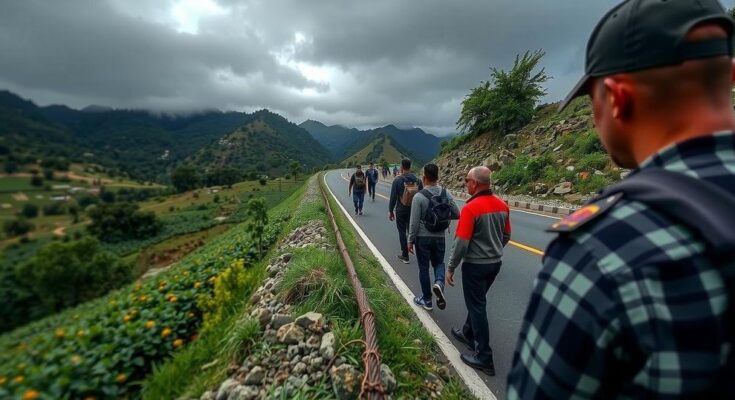Despite the reopening of the Colombia-Venezuela border on September 26, 2022, illicit smuggling remains pervasive as criminal organizations adapt to changing dynamics. Corruption, extortion, and armed group control complicate efforts to restore normalcy. The resultant violence and mistrust hinder potential economic benefits, as local businesses face increased threats and operational challenges.
As night descends upon Cúcuta, Colombia, the environment shrouds smuggling operations that persist unabated despite the recent reopening of the Colombia-Venezuela border. Following the closure ordered by President Nicolás Maduro in February 2019 amidst political turmoil, illegal routes known as “trochas” flourished, facilitating illicit trade and human trafficking. Although the official reopening on September 26, 2022, heralded hopes for restoring normalcy, criminal organizations persist, adjusting their strategies to maintain profitability through extortion and illicit activities. Cargo vehicles traverse the Simón Bolívar and Atanasio Girardot bridges, critical conduits linking Venezuela and Colombia. However, these official crossings have not eradicated the continued smuggling activity, which remains rampant along the trochas, where law enforcement often overlooks illegal transactions. Business leaders initially projected that an increase in legal trade would restore at least $2 billion worth of cross-border activities. Still, recent estimates suggest revenues may not have exceeded $1.2 billion due to prevailing corruption and a lack of trust in Venezuelan authorities. Local traders exploit considerable price differentials between the two nations, with essential goods such as food being smuggled from Colombia to Venezuela at exorbitant markups. Basic staples like milk and potatoes are transported through these illegal networks, often compromising safety and health standards. The pervasive control exercised by armed groups along the border complicates the economic recovery, with notable organizations like the ELN and Tren de Aragua exerting influence and adapting to these new circumstances. The reopening of the border has not diminished armed groups’ impact; instead, it has evolved the dynamics of regional crime. Groups that once relied heavily on the trochas for revenue have shifted their focus, increasing threats against local businesses in Cúcuta. This shift has escalated violence in the area, evident in a rising number of extortion attempts and violent incidents involving grenades. Residents now navigate heightened risks as competition among criminal factions intensifies, indicating a precarious state for both trade and community safety in Cúcuta.
The reopening of the Colombia-Venezuela border came after a prolonged closure instigated by political tensions and humanitarian crises. The initial border lockdown led to a significant rise in smuggling activities, particularly through informal routes known as trochas, which became lifelines for illicit trade and migration during the COVID-19 crisis. Businesses on both sides of the border are eager to restore trade, yet persistent mistrust and criminal activities have complicated efforts to normalize the economic situation. The presence of armed groups further exacerbates instability in the region, creating a multifaceted challenge for local authorities and communities alike.
In summary, while the official reopening of the Colombia-Venezuela border was intended to restore order and economic stability, smuggling activities continue to thrive due to long-standing mistrust and the influence of armed groups. The adaptation of criminal networks to the new environment has led to increased violence and extortion within local communities, impairing prospects for economic recovery. Continuous monitoring and strategic interventions are essential to address the underlying issues and promote a safer, more transparent trading environment.
Original Source: insightcrime.org




